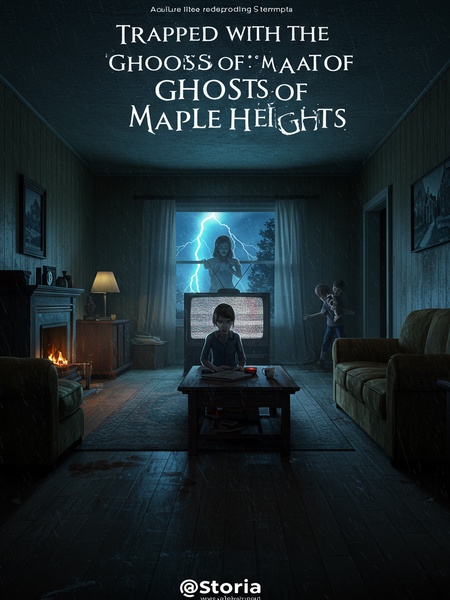Chapter 4: Family Returns, Storms Inside
Grandma checked the wall clock again. It was 10:50. She said, "Ed, it’s getting late. Let’s close up."
She tried to sound firm, but her voice trembled. She glanced at the door, expecting it to fly open. I pressed closer to her, my heart pounding.
Grandpa hesitated. "It’s coming down out there. We can’t just toss people out."
He looked torn, glancing at the stranger, then at the storm, worry etched on his face. He’d always helped travelers, but tonight, his doubt was clear.
Grandma whispered, "We’ll wait till eleven, tops. No matter how hard it rains, we have to close up."
Her grip on my shoulder tightened. I could feel the fear, sharp as ice.
Just then, a cold wind blew in, chilling us to the bone.
The door rattled, the air dropping ten degrees in a heartbeat. The lights buzzed and popped, shadows jumping like startled cats across the walls. I shivered so hard my teeth chattered. Even Grandpa pulled his jacket tighter.
Grandpa forced a smile. "Young man, it’s almost eleven. We’re about to close up."
His words came out thin and uncertain as he gathered the empty bowls, hands shaking.
The man replied, "Don’t worry, sir. My wife’ll be here soon."
He didn’t move, gaze fixed on the door. The words sounded like both promise and threat.
Suddenly, I heard footsteps—tap, tap—from outside.
The sound was muffled by rain, slow and steady, like someone dragging through mud. Goosebumps prickled my skin. I gripped Grandma’s hand tighter.
A woman stepped inside, her face ghostly pale and soaked through. Her hair hung limp, water pooling at her feet. The harsh light made her skin almost blue. She blinked rapidly, adjusting to the warmth.
She held the hand of a little girl in a red raincoat. Rainwater pooled on the welcome mat, thunder booming like a bowling ball down an alley. The little girl’s red raincoat glowed like a stoplight in the gloom. The girl's eyes darted strangely, never focusing on anything.
The raincoat was too big, sleeves covering her hands. She shuffled in, face blank. Rain dripped from the hem, puddling on the floor.
The man said, worried, "Why’re you so late? The soup’s cold. Eat something quick."
He stood up, voice sharp, urgent—truly afraid for the first time. He scooped the little girl into his arms, holding her close as if shielding her from the storm and something unseen.
The girl’s face was eerily calm, unreadable. She leaned into her father, silent, gaze unfocused, almost as if she wasn’t really there. The raincoat made her a bright warning in the dim store.
The woman sat on a bench and forced a smile. "It’s hard walking those back roads in a storm. Got held up."
Her voice was hollow, exhausted. She brushed wet hair from her face, water running down her cheeks like tears. Her hands shook as she tried to straighten her clothes.
Her clothes were drenched, a puddle of dirty rainwater spreading beneath her.
Grandma fetched a mop, glancing uneasily at the puddle, but didn’t interrupt.
Grandma asked, "Sweetheart, who’s your dad? I don’t think I’ve seen you around before."
She knelt to the woman’s level, voice gentle but probing. The woman looked up, eyes shining with something unreadable—loss or anger.
The woman looked up at Grandma and smiled. "Aunt Carol, it’s me, Susan."
Her words hit like thunder. Grandma’s jaw dropped, and she reached out a trembling hand to touch the woman’s cheek. I watched as recognition dawned—shock and old memories flickering in her eyes.
Grandma’s eyes widened. "You’re Susan? Old Tom’s daughter?"
Her voice cracked, forgetting the storm and time—just the woman before her. Decades of church socials, picnics, and laughter seemed to crowd the space.
The woman nodded. "Yes, ma’am. Dad only had me. I came back just to visit his grave."
Her words were heavy with sadness and old wounds. She glanced at the floor, tracing the puddle with her shoe. There was something final in her tone, like she’d already said goodbye a hundred times.
Susan was the first Maple Heights girl to marry out of town. Folks used to gossip about her at church suppers, whispering behind cupped hands. She was a trailblazer, but not everyone thought that was good. Seeing her now—older, tired—I wondered what life had really been like out there.
Grandpa and Grandma exchanged a guilty look, regret in their eyes—a silent apology for how things had been.
Grandpa forced a smile. "Susan, it’s been seven or eight years. We didn’t recognize you."
He tried for cheer, but his voice wobbled. He looked at Susan like she was a ghost—a reminder of choices and the way time slips away.
Susan’s smile faded. She said stiffly, "It’s enough I recognized you."
Her voice went cold, eyes flashing with something sharp—resentment or exhaustion. The room tightened, thick with things unsaid.
She smiled again. "Aunt Carol, Uncle Ed, this is my husband, Doug. He works construction."
She gestured to the muddy man. Doug nodded at Grandpa and Grandma, guarded.
Grandpa smiled. "That’s good. He looks strong."
He nodded, trying to break the tension. It was the kind of thing Grandpa always said to new sons-in-law, even when he didn’t know what else to say. He smiled, but his eyes stayed wary.
The woman stroked the little girl’s head. "This is my daughter, Lily. Her eyes were fine before, but after a bad fever, she lost her sight. She can’t see anything now."
Susan’s voice cracked, hugging Lily tighter. The girl blinked slowly, her eyes empty and distant. For a moment, I felt sorry for her—lost in the storm, unable to see the world.
The little girl in red looked as pale as someone pulled from a frozen river—it was unsettling. Lily’s fingers traced invisible shapes on the tabletop, her blank eyes following something only she could see.
Continue the story in our mobile app.
Seamless progress sync · Free reading · Offline chapters